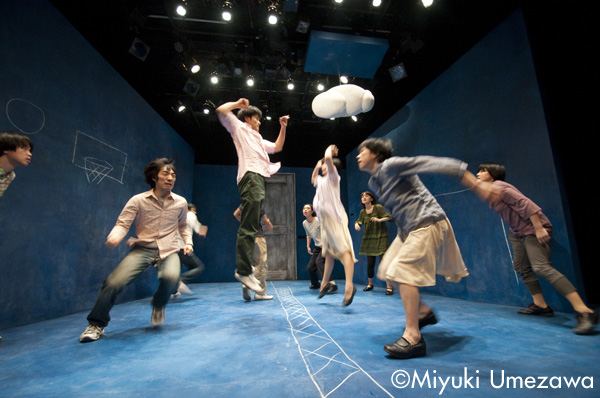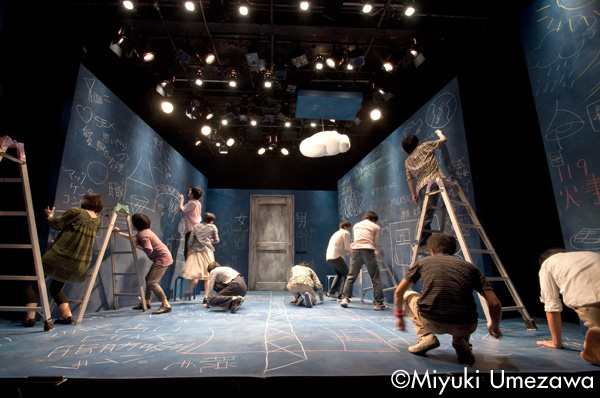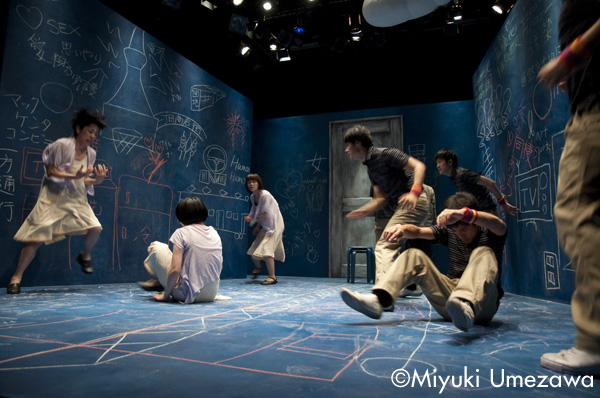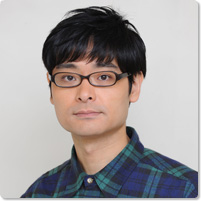In the empty space of the stage a “Man” appears and then a “Woman” appears. Man draws a circle on the wall. The two use this and begin a volley of pantomime. As lines and goal boxes and nets are drawn the number of actors on stage grows and they start playing dodge ball, soccer, baseball and the like. When Man writes “music” on the blackboard the actors begin singing in chorus. As they sing, they write words and draw pictures on the walls and floor relating to things from daily life, society, the environment and faith.
Man and Woman meet. There is an accident on a train, then they meet again by chance, they begin living together, they take trips together. Even as these memories together grow, their hearts eventually drift apart until they reach a point where they no longer converse. Woman begins erasing from the blackboard the feelings and memories the two had shared and the pictures of things like the furniture they have used.
The scene changes. A “Jogging Woman” appears, outfitted in running wear and running hard. Nearby is a concerned-looking man that appears to be her lover. The woman is running toward a river but she isn’t getting any closer to that destination and that makes her grieve that her life is worthless and the world only gets worse. The jogging Woman will appear again as the play progresses, complaining about her frustration with herself and the world.
Man goes to the parts manufacturing company where he works only to be told suddenly by the boss that he is fired. The boss advises him to understand his situation and go out and find his own “light” in the world. When Man gets home he finds most of the things in the apartment have been erased. There is an unexpected hole in the floor and Man falls in.
In the bottom of the hole there is a Man in a Suit who appears to be a white-collar worker. Roused by the sight of this man who appears to have lost hope of escape from the hole, Man makes a desperate attempt to scramble out and succeeds. Free now, he happens upon a prostitute and buys sexual favors from her.
Meanwhile, the Woman who has left her life with Man is unconsciously following a man she happened to see on the street until she also falls into a hole. She struggles to climb out, but just as she manages to get her upper body above ground the Man in a Suit grabs her feet so she can’t climb any higher.
As he wanders the streets, Man is mugged by a thug who steals his clothes and leaves him crawling around in his underwear like a being unable to withstand the force of gravity.
We see the father of Man, who has a home business as a barber. He works, eats and watches television in the same pattern every day. Although he is surprised, he even accepts passively the divorce papers his wife suddenly forces on him. Worried about his son Man, who has arrived at the family home still crawling, the father suggests that he take over the family barbershop, but Man refuses.
Another scene. Man’s maternal grandfather dies in a traffic accident. Man’s grandmother, who has begun to suffer from dementia, appears unable to recognize the reality of her husband’s death. She talks on happy about their good memories together and says that she wishes she could talk with him more. Here, Man asks his mother the reason she chose to divorce his father, but she only replies that it is something that can’t be explained in words.
Just at that moment, the father that Man has always depended on suddenly collapses. As he cares for his now bedridden father, Man sobs as he says, “I don’t know how can I go on living now?” Man’s mother, who has come to help, begins talking about the “journey of life” as she reads the words and ponders the pictures on the walls. She concludes with the statement that the only common trait all human beings share is that they are born from the reproductive organs of women.
Man’s mother continues stroking the face of his bedridden father in a vegetative coma. Man changes into some of his father’s clothes and asks his mother, “Can human beings change?” an answer, his mother begins singing
You are my Sunshine
.
People are gathered in front of a closed door. Man puts his hand on the doorknob. At first attempt, the door closes again immediately, but with the second pull it stays open and the people begin going through to the other side. Then they appear again through the hole in the stage floor and repeat the cycle in a continuing flow, out through the door and up through the hole.
Still stuck down in the hole, the Man in a Suit begs Woman to give him a “kiss full of love.” When she concedes the two are suddenly freed from the hole.
Carried on the back of her desperately running lover, the Jogging Woman finally arrives at the river she was trying to reach. At the river, a large group of people are singing You are my Sunshine, as if in congratulations. Gradually the sound of the river morphs into the bustling sound of the city, where the people are now busily cleaning the streets.
The people who are cleaning are all “Man” and “Woman” leading their individual lives. On either side of the closed door, they are conversing with their unseen counterparts on the other side. After exchanges about which is the inside and which is the outside and whether the door should be pushed or pulled, the door opens quietly to leave the “Men” and “Women” facing each other.
Then, Man alone realizes that light is coming out of the hole. Woman opens her arms in the direction of the hole and embraces the light to her breast.
The light grows stronger, people continue to clean the town, then finally there are two holes (○○) and all that remains is the sun.





